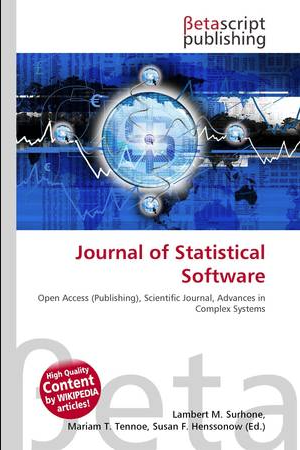Model-Based Clustering, Classification, and Discriminant Analysis Using the Generalized Hyperbolic Distribution: MixGHD R package
IF 8.1
2区 计算机科学
Q1 COMPUTER SCIENCE, INTERDISCIPLINARY APPLICATIONS
引用次数: 11
Abstract
The MixGHD package for R performs model-based clustering, classification, and discriminant analysis using the generalized hyperbolic distribution (GHD). This approach is suitable for data that can be considered a realization of a (multivariate) continuous random variable. The GHD has the advantage of being flexible due to skewness, concentration, and index parameters; as such, clustering methods that use this distribution are capable of estimating clusters characterized by different shapes. The package provides five different models all based on the GHD, an efficient routine for discriminant analysis, and a function to measure cluster agreement. This paper is split into three parts: the first is devoted to the formulation of each method, extending them for classification and discriminant analysis applications, the second focuses on the algorithms, and the third shows the use of the package on real datasets.使用广义双曲分布的基于模型的聚类、分类和判别分析:MixGHD R包
用于R的MixGHD包使用广义双曲分布(GHD)执行基于模型的聚类、分类和判别分析。这种方法适用于可以被认为是一个(多变量)连续随机变量的实现的数据。GHD的优点是由于偏度、浓度和指标参数而具有灵活性;因此,使用这种分布的聚类方法能够估计具有不同形状特征的聚类。该包提供了五个不同的模型都基于GHD,一个有效的例程判别分析,和一个功能来衡量聚类协议。本文分为三部分:第一部分致力于每种方法的制定,将其扩展到分类和判别分析应用;第二部分侧重于算法;第三部分展示了该软件包在实际数据集上的使用。
本文章由计算机程序翻译,如有差异,请以英文原文为准。
求助全文
约1分钟内获得全文
求助全文
来源期刊

Journal of Statistical Software
工程技术-计算机:跨学科应用
CiteScore
10.70
自引率
1.70%
发文量
40
审稿时长
6-12 weeks
期刊介绍:
The Journal of Statistical Software (JSS) publishes open-source software and corresponding reproducible articles discussing all aspects of the design, implementation, documentation, application, evaluation, comparison, maintainance and distribution of software dedicated to improvement of state-of-the-art in statistical computing in all areas of empirical research. Open-source code and articles are jointly reviewed and published in this journal and should be accessible to a broad community of practitioners, teachers, and researchers in the field of statistics.
 求助内容:
求助内容: 应助结果提醒方式:
应助结果提醒方式:


